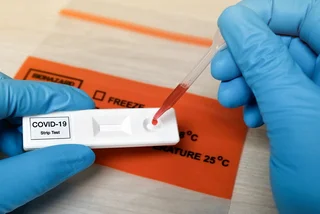The Czech Republic saw 3,200 fewer COVID-19 cases than a week ago, the lowest rise on a workday in the past four weeks Health Ministry's data show. More than 159,000 are currently infected, 8,059 of whom were in hospital as of Monday. The number of those in serious condition has slightly dropped to 1,191.
The COVID-related death toll stands at 5,323, including 189 deaths reported as of yesterday. A total of 429, 880 infections have been registered in the Czech Republic since the coronavirus epidemic outbreak in March, with 277,473 patients since recovering.
Most COVID-19 patients suffer from only mild symptoms of the disease.
Public health officials recorded a lower number of new coronavirus cases, however, they say that the number of new cases is related to the number of tests given. On Sunday, the lowest number of new infections was reported, but also the lowest number of tests in four weeks.
Over the past few days, the share of samples that test positive has dropped below 30 percent. On Monday, it reached the record low level, 20.28 percent, in about a month.
However, the number of COVID-19 fatalities keeps rising. In the past week alone there were 1,160 deaths, bringing the total to 5,323. On Monday, the updated figures show 155 deaths, and another 74 yesterday. Last Tuesday, 243 patients with the virus died, the highest daily death toll since the pandemic began.
The virus is spreading the fastest in the Pelhrimov district, south Bohemia, with 1,148 new cases per 100,000 inhabitants in the past seven days, followed by the Vsetin district, east Moravia, with 1,092 cases. Prague cases continue to decline with 291 new infections per 100,000 over the past week.
The statistical data on the confirmed infections indicate that the measures taken against the coronavirus work well, and consequently, there is no reason to tighten them, but the government should rather prepare for their controlled relaxation, according to Health Minister Jan Blatny (for ANO).
Nevertheless, Central Crisis Staff chief Jan Hamacek (CSSD) told media today that the cabinet must ask the Chamber of Deputies to further extend the national state of emergency. The Chamber of Deputies is to make the decision on Thursday, November 19, ANO's chairman Jaroslav Faltynek said.
The government must still wait before softening its anti-coronavirus restrictions, even though the daily numbers of new infections have started to fall, since the high rate of positive cases among tested samples continues to pose a risk, experts agreed in a debate organized by the Neuron foundation yesterday.
The infection rate has hovered around 30 percent recently. "This is a very high figure. It is turning out that a large number of cases still remain undetected," said epidemiologist Petr Smejkal. He added that problems mainly rest in the stagnating number of tests and insufficient contact tracing of COVID-19 patients.
Similarly, epidemiologist Rastislav Madar said there is no room for restriction relaxation. The most urgent necessity is the reopening of schools, which, nevertheless, is not advisable for now, Madar said, adding that after the softening of restrictions he expects a new rise in infections. That is why he recommends that automatic mechanisms be introduced to react by re-tightening restrictions.












 Reading time: 2 minutes
Reading time: 2 minutes 
























